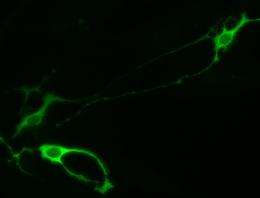Reprogramming brain cells important first step for new Parkinson's therapy, study finds

(Medical Xpress) -- In efforts to find new treatments for Parkinson’s Disease (PD), researchers from the Perelman School of Medicine at the University of Pennsylvania have directly reprogrammed astrocytes, the most plentiful cell type in the central nervous system, into dopamine-producing neurons. PD is marked by the degeneration of dopaminergic neurons in the midbrain. Dopamine is a brain chemical important in behavior and cognition, voluntary movement, sleep, mood, attention, and memory and learning.
“These cells are potentially useful in cell-replacement therapies for Parkinson’s or in modeling the disease in the lab,” says senior author John Gearhart, PhD, director of the Institute for Regenerative Medicine (IRM) at Penn. The team reports their findings in PLoS One.
“Our study is the first to demonstrate conversion of astrocytes to midbrain dopaminergic neurons, opening the door for novel reprogramming strategies to treat Parkinson’s disease,” says first author Russell C. Addis, PhD, a senior research investigator with IRM.
A Different Approach
Parkinson’s affects different areas of the brain but primarily attacks the dopamine-producing section called the substantial nigra. Cells in this region send dopamine to another region called the striatum, where it is used to regulate movement. The chemical or genetic triggers that kill dopamine neurons over time is at the heart of understanding the progressive loss of these specialized cells.
As many as one million people in the US live with PD, according to the Parkinson’s Disease Foundation. Symptoms include tremors, slowness of movements, limb stiffness, and difficulties with gait and balance.
Limited success in clinical trials over the last 15 years in transplanting fetal stem cells into the brains of Parkinson’s disease patients has spurred researchers to look for new treatments. Using PET scans, investigators have been able to see that transplanted neurons grow and make connections, reducing symptoms for a time. Ethical issues about the source of embryonic stem cells; the interaction of cells with host cells; the efficiency of stems cells to reproduce, and their long-term viability and stability are all still concerns about trials using dopaminergic cell transplants to treat Parkinson’s.
First Steps
In the first step towards a direct cell replacement therapy for Parkinson’s, the team reprogrammed astrocytes to dopaminergic neurons using three transcription factors – ASCL1, LMX1B, and NURR1 – delivered with a lentiviral vector.
The process is efficient, with about 18 percent of cells expressing markers of dopaminergic neurons after two weeks. The next closest conversion efficiency is approximately 9 percent, which was reported in another study.
The dopamine-producing neurons derived from astrocytes showed gene expression patterns and electrophysiolgical properties of midbrain dopaminergic neurons, and released dopamine when their cell membranes were depolarized.
The Penn team is now working to see if the same reprogramming process that converts astrocytes to dopamine-producing neurons in a dish can also work within a living brain – experiments will soon be underway using gene therapy vectors to deliver the reprogramming factors directly to astrocytes in a monkey model of PD.

















